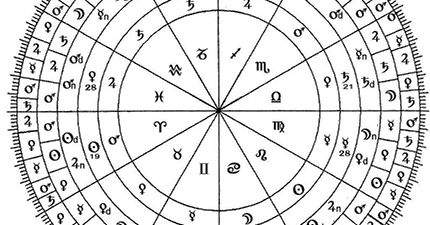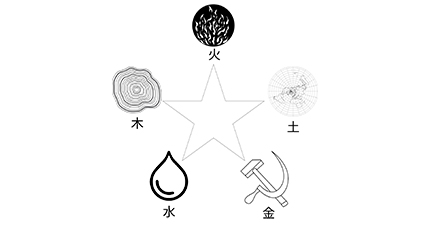The fourth house is about fathering. Too often, I find that people have fathers with major placements in their fourth house. I’ve learned to ask questions about dad carefully when I notice that there are malefics or a lunar node in the fourth house. The fourth house is about father and finding the planet that rules your fourth house, looking at the ways that planet intersects or shares identity with your chart ruler, is about looking at your relationship with a father.
It’s the meridian angles, houses four and ten, that flank and cut into the horizon. This is the spine of your chart. It’s your upbringing.
There’s another meaning of the fourth house, which is loss. I’ve noticed that people tend to go through loss when they move through a fourth house profection year. You’re in a fourth house year when your Saturn opposes itself, when your progressed Moon returns and your nodes reverse, when you leave your thirties for your forties, and when you enter your fifties. The fourth house is sometimes described as being about death but I think that it is more often about loss. There are losses and grievings that don’t circulate around death that are described by the fourth house.
Firmicus talks about the fourth house as being about “family property, substance, possessions, household goods, anything that pertains to hidden and recovered wealth.”
The fourth house is a basement. For a long time, basements were a sign of wealth. It’s hard to build underground and to have a basement meant that you could not only afford storage but that you had things to store. A basement is a crypt. Basements are very different from attics, which are self-contained, because basements connect to the ground where you can find connections to other structures and places through digging. There are ways to escape from a basement.
The connection between undergroundedness and wealth isn’t just Greco-Roman and pastoral, with Hades’s realm being described as abundant and bountiful. It is also Christian and apocalyptic. In Revelations, the wealthy seek shelter from the world by retreating underneath the ground. The basement, or the underground bunker, is also a shelter against social forces.
The fourth house is father but it is also a bunker. It is an image of rediscovered wealth and wealth as protection. The fourth house is where the bodies are buried.
The Fourth House Changes
In the first phase of life, the fourth house is supposed to be about the biological father. I don’t use the Sun to talk about the biological father. I use it to talk about the concept of fathering, which can be found in people or places that have nothing to do with biology. However, I usually do use the fourth house and its ruler to mean the biological father.
There have been too many instances where sitting down with a client and finding that the ruler of the fourth is hidden gave us something about an unknown father or finding that the father had placements in the fourth house that I feel not using the fourth house to signify the biological father would be a disservice.
But the fourth house does change. It multiplies in meaning. The first Saturn return is supposed to give the fourth house the meaning of real estate. I think that one of the assumptions around this is that we are supposed to buy or inherit real estate during our Saturn returns from our fathers.
I do feel that this signification of the fourth house is so far out that it can sometimes feel meaningless for actual people and our lives. Owning property as a marker of adulthood is colonial, alienating, and inaccessible.
The fourth house is about land and it can be about planting seeds. But it is more about noticing the seeds that are already planted—about noticing what bodies are already in the ground. The fourth house is about legacy and it’s not about new seeds but about continued cycles of growth that are already happening underground. There is always change in the fourth house but there is nothing new.
In the last phase of life, the fourth house is about the end. It’s about your grave as a site but also the rituals and customs that surround your grave. It’s about sweeping the grave and keeping it clean. It’s about feeding the ghosts and burning the relics. It’s about keeping memory not static but alive through repetition and ritual. People tend to start thinking about their gravesites during their last piece of life, wondering whether they will be buried near ancestors or far from them. They want photos of their burial grounds so that they feel taken care of in death. They start to enjoy the ways that they know they will be kept even as they leave.
The Moon and Saturn
The first co-significator for the fourth house is the Moon. It lurks here with Saturn. Together, the Moon and Saturn are meant to refer to the father.
Saturn, here, I think has to do with the revolving nature of loss. You understand loss because you want to attach. There’s a cyclical nature to Saturn and this is emphasized by the Moon because the Moon completes its cycles alongside Saturn.
Twenty seven is a funny age. A lot of people, famous people, have died at twenty seven—Kurt Cobain, Amy Winehouse, Jimi Hendrix, Janis Joplin, and James Morrison. Twenty seven isn’t when your Saturn return starts. It’s your progressed Moon return but it’s also a fourth house profection year. It’s the first fourth house year that you have as an adult. I have found that twenty seven is often an age in which people face their first big loss.
But the Moon here! The Moon is about the body. There is a body buried in the fourth house that you find when you enter it.
The fourth house is about loss but it’s also about remaking your body. It’s about birth. I meet a lot of trans people who realized their transness during a fourth house year. I meet people who discover family secrets that turn their memories on their heads. The fourth house is a keeper of memory, hidden and rediscovered. Memories are not stored and lie latent and unchanging. They are stories and images that are always changing because they are always in the process of being rediscovered.
Working with the Fourth House
I always think that the fourth and tenth houses are the hardest to work with because they take time. Usually when you cast a chart, you take the horizon line as the beginning. Most house systems center the self, which is represented by the ascendent and orient the meridian around the horizon. Only one house system that I know of, the M-house system, uses the meridian as a starting point.
When you talk to someone about their father, about loss, and about legacy—this takes an entire session. It takes time. It is hard to do this while still orienting the session around the horizon and the self. I try to make us go back to the self when I know that we are doing natal astrology and not genealogical. I try to ask how a parent or loss or legacy affects the identity. But that’s not always easy because grief is so physical that it takes on its own shape.
I think that when you work with your own fourth house, that you should orient the chart around the fourth. Start with the meridian and map the chart out that way. Remember where your ancestors are buried. This is a big one.
Working with the fourth house often has to do with figuring out where you want your father buried. Does he have any demands around it and do you fight about where you imagine the burial site to be? Where do you keep the living memory of your father in your own being?
Working with the fourth house often has to do with imagining yourself when you are buried. Where would your stuff go and who do you want sorting through it all? Where do you want to leave things and people? What do you want forgotten?
Working with the fourth house often has to do with figuring out your relationship to land. Are your ancestors buried in a land far from you because you’re an immigrant? Do you know where your family bones are? How do you care for the places that house these bones?
There is loss in the fourth house but there is a sense of return as well. The fourth house is a place that we can’t not return to. It’s an inevitable house. It’s a sanctuary only in the sense that burial is sanctified.s


